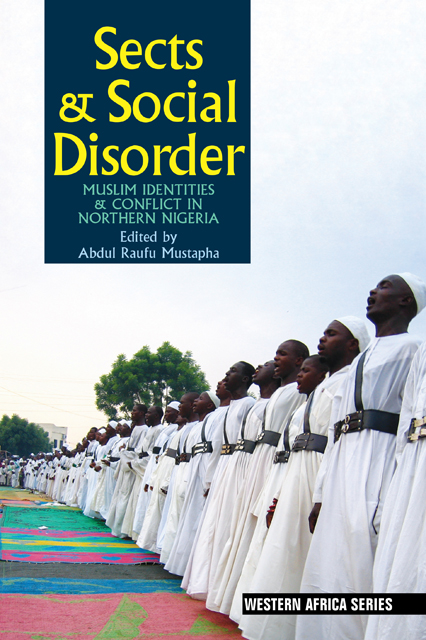Book contents
- Frontmatter
- Dedication
- Contents
- List of Maps, Figures & Tables
- Notes on Contributors
- Foreword by Muhammad Sani Umar
- Acknowledgements
- Glossary
- 1 Introduction: Interpreting Islam: Sufis, Salafists, Shi’ites & Islamists in northern Nigeria
- 2 From dissent to dissidence: The genesis & development of reformist Islamic groups in northern Nigeria
- 3 Contemporary Islamic sects & groups in northern Nigeria
- 4 Experiencing inequality at close range: Almajiri students & Qur’anic schools in Kano
- 5 ‘Marginal Muslims’: Ethnic identity & the Umma in Kano
- 6 Understanding Boko Haram
- 7 Conclusion: Religious sectarianism, poor governance & conflict
- Index
4 - Experiencing inequality at close range: Almajiri students & Qur’anic schools in Kano
Published online by Cambridge University Press: 24 February 2023
- Frontmatter
- Dedication
- Contents
- List of Maps, Figures & Tables
- Notes on Contributors
- Foreword by Muhammad Sani Umar
- Acknowledgements
- Glossary
- 1 Introduction: Interpreting Islam: Sufis, Salafists, Shi’ites & Islamists in northern Nigeria
- 2 From dissent to dissidence: The genesis & development of reformist Islamic groups in northern Nigeria
- 3 Contemporary Islamic sects & groups in northern Nigeria
- 4 Experiencing inequality at close range: Almajiri students & Qur’anic schools in Kano
- 5 ‘Marginal Muslims’: Ethnic identity & the Umma in Kano
- 6 Understanding Boko Haram
- 7 Conclusion: Religious sectarianism, poor governance & conflict
- Index
Summary
Introduction
The almajirai, boys and young men enrolled in ‘traditional’ Qur’anic schools rather than formal (Western-style) education, have become an issue of growing concern in northern Nigeria. The students of such schools have attracted attention in the context of increased attempts to achieve universal primary education and growing concerns about child welfare. In the context of growing violent conflict, they have also been associated with Islamic radicalization and militancy. The current spate of Boko Haram violence in northern Nigeria has carried such modes of thinking to the extremes. The almajiri education system is described as ‘Nigeria’s ticking time bomb’ (Kulutempa 2011) and as a threat to the national security (Lawal 2011). Similarly, Nobel laureate Wole Soyinka declared in an article in the Newsweek Magazine about Boko Haram that the ‘butchers of Nigeria’ have ‘been deliberately bred, nurtured, sheltered, rendered pliant, obedient to only one line of command, ready to be unleashed at the rest of society. They were bred in madrassas and are generally known as the almajiris’ (Soyinka 2012). ‘Traditional’ Qur’anic students are one group of young Muslims that seem, within some popular imagination, to personify the potential for violence within northern Muslim society. This chapter explores the position of this ubiquitous social group in Kano.
As the almajirai are thought about first and foremost as a threat, policy recommendations concerning them are often cast in terms of containment, quarantine and even eradication. Several states and also federal bodies consider legislative action against the almajiri system, either under anti-trafficking legislation or by putting a ban on begging (e.g. Hassan 2013; Salihi 2013). Abolitionist and punitive approaches are based on the idea that problematic outcomes are produced within the (narrow) confines of ‘traditional’ Qur’anic schools where ‘backward’ and ‘neglectful’ parents abandon children they do not want to take responsibility for (e.g. Kumolu 2012). Qur’anic schools are considered sites where children suffer abuse at the hands of exploitative teachers and where they learn radical doctrines. This chapter shows the problems of such reasoning. The almajirai are often portrayed as a distinct and clearly circumscribed demographic. This is misleading. In terms of skills and future prospects, little differentiates them from other poor undereducated youths from rural households. Young people frequently move between different educational systems, which means few children are ‘pure’ almajirai.
- Type
- Chapter
- Information
- Sects and Social DisorderMuslim Identities and Conflict in Northern Nigeria, pp. 98 - 125Publisher: Boydell & BrewerPrint publication year: 2014
- 3
- Cited by



